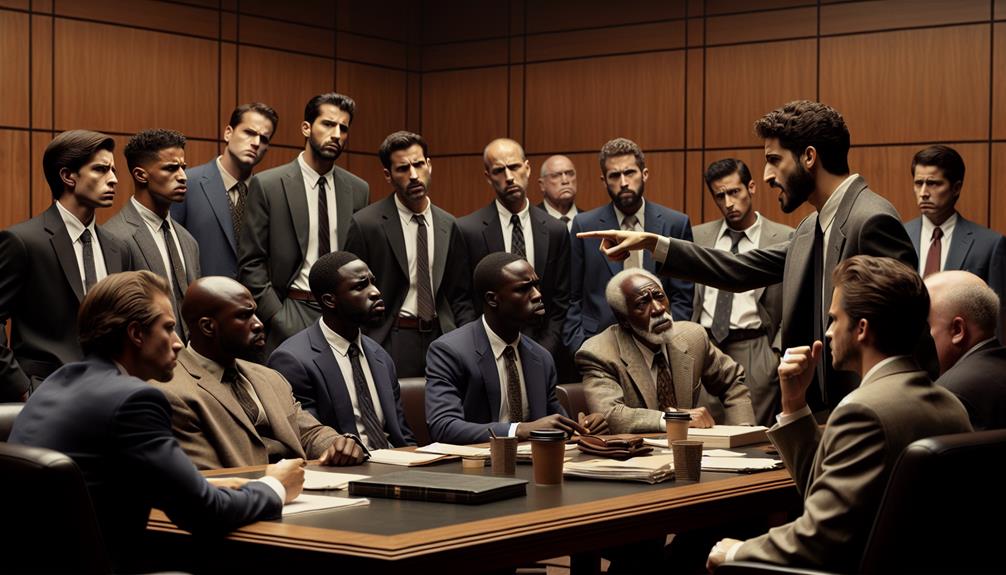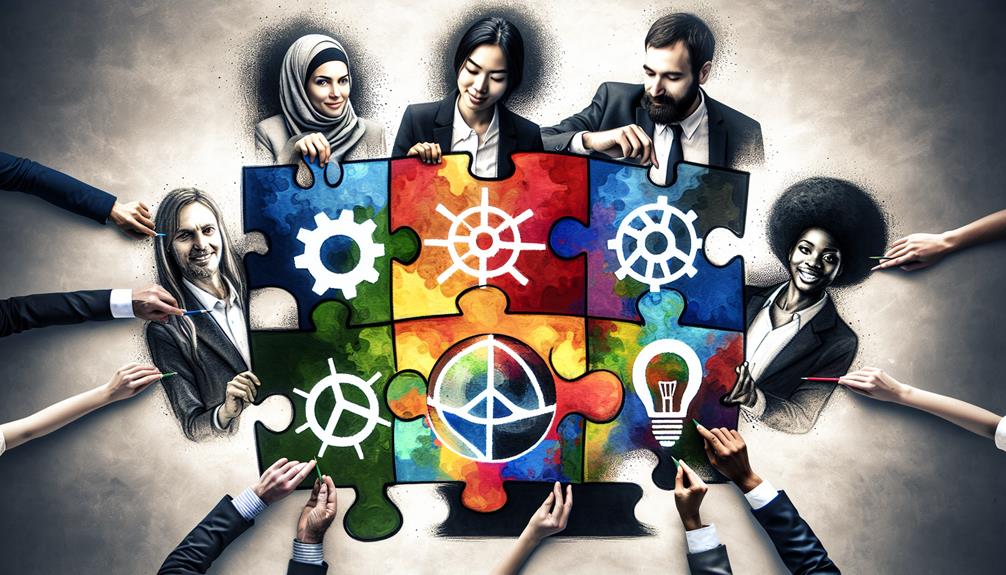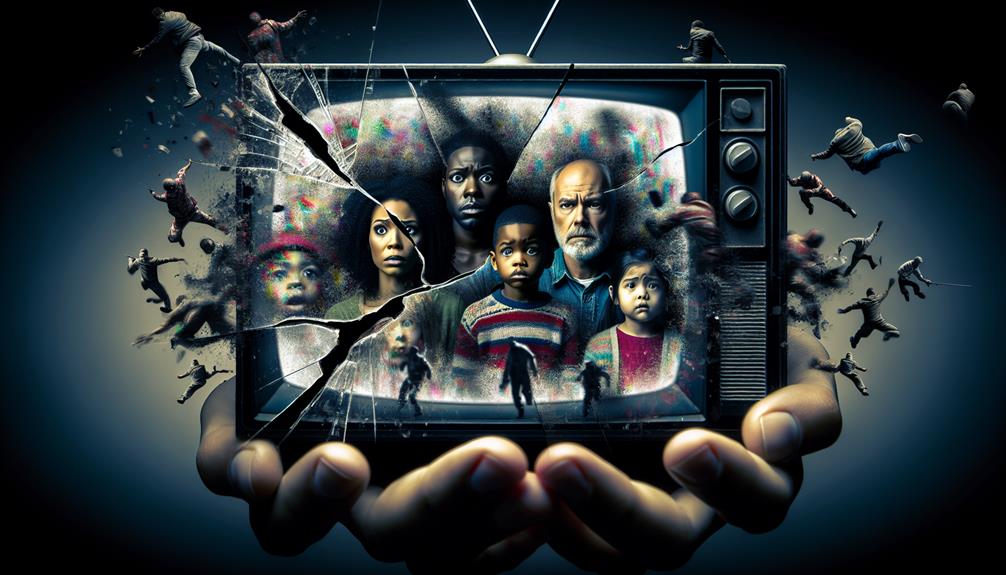Isn't it curious how a film made in 1957 continues to resonate in today's courtroom dramas? As you revisit '12 Angry Men,' you might wonder how its themes of justice, bias, and human fallibility remain relevant. Consider probing deeper by asking what drives Juror 8's moral fortitude against eleven opposing voices, or how the film's minimalist setting amplifies the tension and character development. What does the evolving dynamic among the jurors reveal about societal values then and now? Each question not only enriches your understanding but also connects you to broader societal conversations, leaving you to ponder where else these insights might apply.
Overview of 12 Angry Men
As you examine '12 Angry Men', consider how the plot's simplicity masks a complex exploration of human nature and justice.
Reflect on how each character, particularly Juror 3, embodies broader societal themes, challenging your preconceptions about authority and bias.
The film's focus on the power of reasoning not only drives the narrative but also invites you to question the efficacy of the judicial system itself.
Plot Summary
'12 Angry Men' unfolds in a New York City courthouse, where twelve jurors deliberate the fate of a young defendant accused of murdering his father. As you watch, you're drawn into a claustrophobic room where the entirety of the film takes place, emphasizing the intense, pressure-cooker atmosphere that builds as the jurors confront their own prejudices and preconceptions.
Initially, it seems a straightforward case with a near-unanimous verdict of guilty. However, as the deliberations unfold, you witness a remarkable transformation. The plot hinges on the doubts of Juror #8, whose initial lone stance against a guilty verdict acts as a catalyst for a deeper examination of the evidence. His insistence on discussing the case in detail forces the other jurors to confront the reliability of the testimonial and circumstantial evidence presented.
This insistence on scrutiny reveals the complexities of the judicial process and the immense responsibility of the jurors. It raises critical questions about the nature of justice and the concept of reasonable doubt. As tension escalates, the story exposes how personal biases and experiences can cloud judgment, challenging you to ponder the impact of your own preconceptions.
Through its tight narrative, '12 Angry Men' masterfully explores the dynamics of consensus-building and the search for truth in a flawed system.
Character Analysis
As you analyze Juror 8, the protagonist of *12 Angry Men*, consider how his role as a catalyst exposes the biases and weaknesses within the jury system. His unique approach to questioning evidence not only disrupts the initial consensus but also forces other jurors to confront their own preconceptions.
This critical examination of Juror 8's character reveals the pivotal influence of integrity and reason in achieving justice.
Juror 8: The Protagonist
Juror 8, the protagonist of '12 Angry Men,' embodies the pivotal role of dissent in a system that often values quick consensus over thorough deliberation.
Courageous Stand: He's unafraid to stand alone against 11 other jurors.
Empathy: Displays deep empathy, viewing the defendant as a person, not just a case.
Logic Over Emotion: Uses logical reasoning to dissect the evidence.
Influence: Gradually sways the opinions of his fellow jurors.
Juror 3: The Antagonist
In the film '12 Angry Men,' Juror 3 emerges as the central antagonist, whose personal biases cloud his judgment throughout the deliberation process. Portrayed with intense fervor, his character isn't just opposing Juror 8, the voice of reason, but also battling his internal conflicts.
His aggressive demeanor and staunch stance against the defendant initially paint him as merely stubborn. However, as you explore further, you realize his motivations are intricately linked with his strained relationship with his own son. This personal turmoil influences his perception of the young defendant, leading him to project his feelings of betrayal and anger.
Juror 3's journey is critical in understanding the dynamics of the jury room. His eventual realization and change of heart are pivotal, illustrating the potential for personal growth and the impact of introspection. His character arc is a compelling study of how deeply personal issues can cloud one's judgment in critical situations.
You see, his initial inability to separate the personal from the factual highlights a significant challenge in decision-making processes. By the end, his transformation isn't just a victory for justice but a personal redemption, making him a complex figure worth your analytical attention.
Themes Explored
As you examine '12 Angry Men,' you'll find that the themes of justice and prejudice are central to the narrative.
The film critically portrays how personal biases shape the jurors' perceptions, questioning the ideal of impartial justice in a democratic society.
Consider how the tension between individual prejudices and the collective pursuit of justice drives the plot and reveals deeper societal issues.
Justice and Prejudice
Exploring '12 Angry Men' reveals how deeply justice and prejudice are interwoven, urging you to ponder their impacts on the verdict.
- Individual biases: Each juror's background influences their initial stance.
- Group dynamics: Peer pressure shapes the discussions and decisions.
- Change of heart: Critical thinking and empathy lead to shifts in opinion.
- System flaws: The film exposes potential prejudices within the judicial system itself.
Power of Reasoning
Delving into '12 Angry Men,' you witness the compelling use of reasoning as a tool for revealing truth in a clouded jury room. As the jurors, initially leaning towards a quick guilty verdict, are swayed by Juror #8's methodical deconstruction of the evidence, you see the transformative power of logical analysis. His insistence on discussing the facts in detail introduces an essential shift in perspective among the jurors, who begin to question their assumptions and biases.
As you analyze the unfolding drama, it's clear that reasoning isn't just about the logical structuring of thoughts; it's deeply intertwined with ethical considerations. Each juror's background, personal beliefs, and emotional biases intricately influence their reasoning processes. You're prompted to question: is pure reason possible, or is it always colored by personal experiences?
Moreover, the film highlights that reasoning requires courage. It's not merely an intellectual exercise but a bold stance against conformity. Juror #8's resilience in the face of overwhelming opposition illustrates that reasoning can be a solitary fight for truth, demanding not only intellectual but also moral strength.
'12 Angry Men' serves as a poignant reminder of reasoning's dual demand for logic and courage in the quest for justice.
Impact of 12 Angry Men
As you contemplate the 'Impact of 12 Angry Men,' it's vital to analyze how its cinematic techniques reshaped film narratives about justice and confined settings.
You'll find its social impact equally noteworthy, as the film challenged viewers to reflect on their biases and the dynamics of group decision-making.
These elements not only revolutionized film form but also echoed through societal attitudes towards justice systems.
Cinematic Influence
'12 Angry Men' revolutionized the way filmmakers use confined settings to heighten drama and explore complex themes. By situating the entire narrative in a single jury room, the film masterfully demonstrates how spatial limitations can amplify tension and character development. You're drawn into the claustrophobic atmosphere, where every camera angle and piece of dialogue feels intensely significant.
Here's how '12 Angry Men' has influenced cinema:
- Minimalist Setting Amplifies Tension: The limited space forces characters into close physical and ideological proximity, magnifying conflicts and character arcs.
- Focus on Dialogue Over Action: This film proves that riveting stories can hinge on dialogue alone, inspiring movies and plays that prioritize sharp, realistic exchanges.
- Character-driven Plot: It emphasizes the power of character development over elaborate set pieces, encouraging a more introspective form of storytelling.
- Economic Storytelling: The film's ability to convey deep narratives within a confined setting has inspired filmmakers to craft more focused and budget-conscious productions.
Analyzing '12 Angry Men,' you see its blueprint in various modern films and plays that choose to explore human nature in tightly sealed pressure cookers. The film's legacy is a tribute to the power of simplicity and depth in storytelling.
Social Impact
Beyond its cinematic achievements, '12 Angry Men' profoundly impacted societal views on justice and the legal system. You've likely seen how the film scrutinizes the intricacies of the jury deliberation process, a cornerstone of American democracy. But what you mightn't have considered is how it challenges you to confront your own preconceptions and biases. This isn't just a film; it's a mirror reflecting deep societal issues that resonate through time.
Through its intense portrayal of a jury's deliberation in a murder case, you're forced to acknowledge the power each juror holds, and the profound effect of personal prejudices on that power. It's unsettling to see how close justice is to being miscarried when influenced by bias and indifference. You're reminded that justice isn't merely about the law; it's deeply human and inherently flawed.
The film's influence stretches beyond the screen, encouraging a dialogue about racial, social, and ethical biases within the legal system. It's credited with sparking reforms in how juries are understood and depicted, urging legal professionals and the public alike to aim for a more impartial system. You're left to ponder: How often do these discussions influence real-life courtrooms? Isn't it vital they do?
Legacy of 12 Angry Men
As you consider the enduring legacy of *12 Angry Men*, note how its critical acclaim has cemented its status as a cornerstone of American cinema.
The numerous remakes and adaptations, spanning different cultures and formats, underscore its universal themes of justice and moral integrity.
These reinterpretations invite you to explore how the core message of the film resonates, or sometimes clashes, with contemporary societal values.
Critical Acclaim
Reflecting on its enduring legacy, '12 Angry Men' has garnered tremendous critical acclaim for its compelling exploration of the dynamics of justice and prejudice. This film, directed by Sidney Lumet and released in 1957, hasn't only stood the test of time but has also become a staple in discussions about cinematic greatness and narrative efficacy.
Its acclaim isn't just about the stellar performances or Lumet's tight direction; it's deeply rooted in the film's ability to stimulate thought and evoke emotional responses from its audience. Here's what makes '12 Angry Men' so critically celebrated:
- Unparalleled Script: The script examines complex themes with remarkable subtlety and intensity, turning what could be a mundane jury deliberation into a riveting psychological drama.
- Character Development: Each juror is uniquely crafted, showcasing a wide spectrum of human behavior and prejudices, which challenges you to reflect on your own views and biases.
- Cinematic Techniques: Lumet's use of close-ups and long takes increases the tension and claustrophobia, amplifying the emotional stakes.
- Cultural Impact: The film's continued relevance in law schools and debates on justice underscores its profound influence on societal perceptions of morality and legality.
Analyzing '12 Angry Men', you'll find its acclaim is well-deserved, as it masterfully dissects the complexities of human nature and justice.
Remakes and Adaptations
The pivotal influence of '12 Angry Men' extends beyond its original release through various remakes and adaptations, each bringing a fresh perspective to its timeless narrative. You've likely seen the original 1957 film directed by Sidney Lumet, noted for its intense focus and claustrophobic atmosphere. However, the story's adaptability has been tested through numerous iterations, including a 1997 television film directed by William Friedkin and international versions like Russia's '12' by Nikita Mikhalkov.
What's essential to dissect here is how these adaptations maintain the core themes of justice, prejudice, and human fallibility while altering settings or demographics to resonate with their specific audiences. For instance, Friedkin's version incorporates a more diverse jury and updates the dialogue to reflect contemporary speech, demonstrating how societal shifts influence judicial perceptions.
Each version serves as a mirror to its society, highlighting that the essence of '12 Angry Men' isn't confined to a 1950s American jury room but is a universal examination of dialogue and democracy.
As you explore these adaptations, consider how changes in character backgrounds and setting nuances affect the story's tension and moral questions. Do these transformations enrich the original, or do they dilute its poignant critique of human nature?




